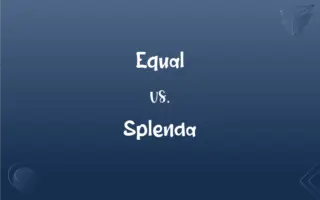NIPRNet vs. SIPRNet: What's the Difference?
Edited by Aimie Carlson || By Janet White || Published on March 4, 2024
NIPRNet (Non-classified Internet Protocol Router Network) is used for exchanging unclassified information, while SIPRNet (Secret Internet Protocol Router Network) is for classified information up to the secret level.

Key Differences
NIPRNet is a network primarily used for exchanging unclassified, sensitive information within the U.S. Department of Defense and related support organizations. SIPRNet, on the other hand, is designed for transmitting classified information, specifically up to the 'secret' level, across similar entities.
Access to NIPRNet is controlled but less restricted compared to SIPRNet, as NIPRNet handles information that is sensitive but not classified. In contrast, SIPRNet requires more stringent access controls and security clearances, due to its handling of classified data.
NIPRNet's infrastructure is separate from the public internet for security reasons, although it handles non-classified information. SIPRNet, however, operates on a completely separate and secure infrastructure to ensure the confidentiality of the classified information it transmits.
NIPRNet is used for day-to-day communications within the U.S. military and associated agencies for non-classified matters, while SIPRNet is reserved for more sensitive communications that require a higher level of security and confidentiality.
Both networks are essential for U.S. national security operations, with NIPRNet facilitating routine operational communication and SIPRNet handling more sensitive strategic communication.
ADVERTISEMENT
Comparison Chart
Purpose
For unclassified but sensitive information
For classified information up to 'secret' level
Access Control
Controlled but less restricted
Highly restricted with security clearances
Connection
Separate from public internet
Completely separate and secure network
Usage
For routine, non-classified communication
For sensitive, classified communication
Security Level
Sensitive but unclassified
Classified up to 'secret'
ADVERTISEMENT
NIPRNet and SIPRNet Definitions
NIPRNet
A secure, but not classified, communication network for the DoD.
NIPRNet is regularly used for daily operational briefings.
SIPRNet
A restricted-access network ensuring confidentiality of secret data.
Access to SIPRNet requires a high-level security clearance.
NIPRNet
An essential tool for routine U.S. military communications.
NIPRNet facilitates our base's day-to-day administrative tasks.
SIPRNet
A network for transmitting classified U.S. government data.
I use SIPRNet to discuss classified operational strategies.
NIPRNet
A secure platform for unclassified defense-related communication.
We coordinate logistics with other units over NIPRNet.
SIPRNet
A high-security network for secret level information in the U.S. military and government agencies.
Our classified mission details are communicated via SIPRNet.
NIPRNet
A network for transmitting unclassified U.S. government information.
I accessed NIPRNet to send our department's weekly reports.
SIPRNet
An essential communication tool for strategic, classified military operations.
Strategic planning for sensitive operations is conducted over SIPRNet.
NIPRNet
A controlled-access network for sensitive, but unclassified data.
Our team uses NIPRNet for sharing sensitive project details.
SIPRNet
A secure digital platform for handling national security information.
SIPRNet is vital for sharing information that affects national security.
FAQs
Is NIPRNet connected to the public internet?
No, it operates on a separate infrastructure for security reasons.
What security clearance is required for SIPRNet?
High-level security clearance is typically required for SIPRNet access.
What type of information is transmitted via SIPRNet?
Classified information up to the 'secret' level.
How secure is SIPRNet?
Extremely secure, with stringent access controls and a separate, secure network.
What kind of data is inappropriate for NIPRNet?
Classified data should not be transmitted via NIPRNet.
What is NIPRNet used for?
For transmitting unclassified but sensitive U.S. government information.
Who has access to NIPRNet?
U.S. military, Department of Defense, and related support organizations with controlled access.
Can anyone in the DoD access SIPRNet?
Only those with the required security clearance and need-to-know can access SIPRNet.
What is the main purpose of SIPRNet?
To handle sensitive strategic communication for U.S. national security.
How does SIPRNet protect classified information?
Through encrypted channels, strict access controls, and a secure network.
Is SIPRNet used for routine communication?
No, it's reserved for sensitive, classified communication.
Are civilians allowed on NIPRNet?
Access is generally restricted to military and related personnel.
What happens if sensitive data is accidentally sent over NIPRNet?
There are protocols for handling such breaches, including potential security investigations.
Can classified information be sent over NIPRNet?
No, NIPRNet is only for unclassified but sensitive information.
Are emails sent over SIPRNet encrypted?
Yes, all communications over SIPRNet are encrypted.
Is NIPRNet used daily?
Yes, it's used for day-to-day, non-classified communications within the military.
Does NIPRNet have cybersecurity measures?
Yes, NIPRNet employs various cybersecurity measures to protect sensitive information.
Can NIPRNet be used for personal communication?
No, it's intended for official government and military use only.
Can SIPRNet be accessed remotely?
Remote access is highly restricted and controlled, if allowed at all.
Is training required to use SIPRNet?
Yes, proper training and clearance are required for SIPRNet use.
About Author
Written by
Janet WhiteJanet White has been an esteemed writer and blogger for Difference Wiki. Holding a Master's degree in Science and Medical Journalism from the prestigious Boston University, she has consistently demonstrated her expertise and passion for her field. When she's not immersed in her work, Janet relishes her time exercising, delving into a good book, and cherishing moments with friends and family.
Edited by
Aimie CarlsonAimie Carlson, holding a master's degree in English literature, is a fervent English language enthusiast. She lends her writing talents to Difference Wiki, a prominent website that specializes in comparisons, offering readers insightful analyses that both captivate and inform.







































































